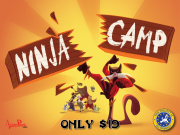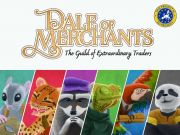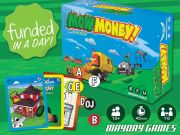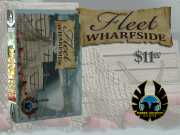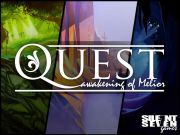Roadkill Rivals (Pygmy Giraffe Games) – In this quirky card game, players are competing to create the most roadkill. In order to do so they draw from the cards laid out in the middle of the table. Players collect vehicle and animal cards of varying strength and attempt to create combinations based on those strength values in order to make roadkill and score points. Players can also use their animals and vehicles to sabotage other players by knocking cards out of their hands, while Road Side cards grant special, temporary abilities.
Casual Game Crowdfunding: Roadkill, Swords and Ninjas

This is the month for lovers of card games and deck builders or just people who love some awesome animal artwork in their games. Also be sure to check out our 4th year Kickstarter campaign for Casual Game Insider!
100 Swords (Laboratory) – In this 2-player dungeon crawling deck-builder, players have a variety of different card types they can choose from. Movement cards help you explore the dungeon, strength cards can be used to defeat monsters, and energy cards are used to acquire new items. The game ends once the dungeon runs out of cards or the boss is defeated, at which point the player with the most gold wins. The campaign offers two separate decks, both of which represent separate dungeons but they can also be mixed together to build new and unique dungeons to explore.
Ninja Camp (Action Phase Games) – A family-friendly game about competing to be the Ninja Master's own personal apprentice. The deck is laid out, face up, in the middle of the table and players are each given two cards. Players then use these cards to move around the board, collect the cards they land on, increase their hand size, and slowly shrink the game board. Each player takes on the role of a specific trainee animal ninja who has their own individual ability that can be used once per game.
Dale of Merchants (Snowdale Design - LudiBooster) – Players are all seeking to join an exclusive guild of merchants by winning an annual trading competition held in the town of Dale. During the game, players use and purchase new cards as well as adding them to their market stall. The first player who fills up their merchant stall wins the game. The merchant stall is filled by creating stacks of goods, with the stacks each ranging from values of 1 to 8 in consecutive order. The game comes with adorable art, animal characters filling the roles of the merchants, while multiple decks that you can mix and match offers variety in the gameplay.
Mow Money (Mayday Games) – Usually in bidding games, players who bid the highest win. In Mow Money things are a little different, with players running rival landscaping businesses and trying to undercut each other’s prices. Landscaping contracts are won by offering to do the work for a lower price than your opponents. Contracts earn your business reputation points, as does buying more lawnmowers. At the end of the game, the player with the most reputation wins.
Fleet Wharfside (Eagle-Gryphon Games) – This game is a standalone set in the same universe as Fleet and features slightly easier rules but lots of interesting gameplay mechanics. The ships are coming into dock and on their turns players must either visit the port to collect their goods or go to the market in order to buy contracts for those goods. Contracts give players special abilities that give them advantages in the game, but once players fill those contracts with their goods, they lose that ability, meaning that choosing the right time to cash in on a contract can be a tricky problem.
Quest: Awakening of Melior (Andrew Wilson) – Quest is designed as solo-gaming experience, though there are both competitive and cooperative variant rules. At the start of the game you choose one of two characters. The character you play changes the events that will occur in your travels. Each turn, before you face an encounter, you draw an event card which can have one-time or long lasting effects. Some events will also give you quests, such as to defeat a certain number of specific encounter types. If you successfully complete a quest you win the game. Combat is calculated using your character’s stats and creating dice combos. If you fail an encounter, you lose hit points. If your health reaches zero, you lose the game.
Full disclosure: unless otherwise noted, we have not seen or played any of the above games. Our assessment of each is based on the information given on the crowdfunding project page.






